|
|
|
Sort Order |
|
|
|
Items / Page
|
|
|
|
|
|
|
| Srl | Item |
| 1 |
ID:
091952
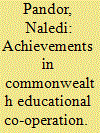

|
|
|
|
|
| Publication |
2009.
|
| Summary/Abstract |
The Singapore and Harare Declarations proclaim the Commonwealth values and principles to which South Africa adheres. The Aso Rock Declaration shows that good governance can overcome poverty. There is a potential crisis of poverty and inequality, in which education should be given priority. The Commonwealth needs to advocate gender equity and emphasise the interdependence of the primary, secondary and tertiary sectors. It should find cheaper methods in secondary education and more open schooling.
|
|
|
|
|
|
|
|
|
|
|
|
|
|
|
|
| 2 |
ID:
091953
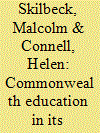

|
|
|
|
|
| Publication |
2009.
|
| Summary/Abstract |
When compared with global bodies such as the United Nations Educational, Scientific and Cultural Organisation (UNESCO) and The World Bank and with the Organisation for Economic Co-operation and Development (OECD), Commonwealth education programmes are modest in scale and resourcing. Yet there have been significant successes, including the Commonwealth Scholarship and Fellowship Plan and the Commonwealth of Learning. The distinctive features and strengths of UNESCO and OECD in international education collaboration and partnerships are useful sources of ideas for strengthening Commonwealth education. There is considerable scope for more intense collaboration and Commonwealth-wide partnerships in addressing shared concerns.
|
|
|
|
|
|
|
|
|
|
|
|
|
|
|
|
| 3 |
ID:
092165
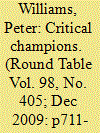

|
|
|
|
|
| Publication |
2009.
|
| Summary/Abstract |
The Commonwealth is rooted in past movement of peoples and in present-day links between individuals and institutions. The health of the 'Commonwealth of states' depends on the concurrent existence of a vibrant 'Commonwealth of peoples'; but human development is accorded low priority in Commonwealth agendas and the official Commonwealth, while publicly acknowledging civil society's importance, has largely neglected the challenge of raising awareness of and interest in the Commonwealth among ordinary people. Commonwealth associations are potential allies in tackling this task. They are particularly numerous in the education sector, which has more extensive Commonwealth co-operative networks than any other, even though some organisations have faded away. The record of the Council for Education in the Commonwealth, now in its 50th year, demonstrates the value to the Commonwealth of having among its collaborators critical champions of its work.
|
|
|
|
|
|
|
|
|
|
|
|
|
|
|
|
| 4 |
ID:
091951
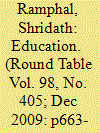

|
|
|
|
|
| Publication |
2009.
|
| Summary/Abstract |
The 2009 UK Forum for International Education and Training conference theme, politics, policies and progress in education, can be illustrated from experiences of government in Guyana, of the role of the Secretary General of the Commonwealth and of influential UN commissions. Tremendous progress has been made in the expansion and development of Commonwealth education systems over the past 50 years, although many obstacles have been encountered. Understanding of the potential and limitations of education in relation to development has greatly increased, but persistent problems of quality and inequality have yet to be resolved. As the world has shrunk, international interdependence in education has increased and the global community needs to apply policy formation and political processes intelligently in national as much as in international contexts. The Commonwealth has never enjoyed the 'hard power' at the disposal of larger bilateral and multilateral agencies through their substantial financial resources. It has the 'soft powers' of pioneering thinking and progressive strategy, consultation and co-operation across economic social and cultural divides, and of empowering even the smallest Commonwealth countries. The 'soft power' approaches to which the Commonwealth is committed should be an increasingly valued part of international policy-making and political accommodation in educational initiatives, through which a more equitable and harmonious future world community can be built.
|
|
|
|
|
|
|
|
|
|
|
|
|
|
|
|
| 5 |
ID:
092167
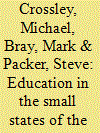

|
|
|
|
|
| Publication |
2009.
|
| Summary/Abstract |
Among the 52 member states of the Commonwealth, 28 have populations below two million. Small states thus comprise over half of the total. Within the group, most are at the lower end of the population scale: 22 have populations below one million, and 13 have populations below 250,000. The Commonwealth gives special attention to small states, and the Commonwealth Secretariat has taken a leadership role in identifying their distinctive features. At the same time, contexts and modalities have changed significantly over the decades. Most obvious have been the opportunities and challenges of globalisation. The internet has significantly reduced the isolation of small states, and has given opportunities to access expertise that could not previously have been imagined. Technological advances have facilitated forms of collaboration, such as the Virtual University for the Small States of the Commonwealth. The cross-national interconnectedness in this era of globalisation also brings challenges. Many small states are well advanced on the Education for All objectives and the Millennium Development Goals, but others have some distance to go. There is value in collaboration within the Commonwealth, both among small states as a group and between small states and larger entities. The Commonwealth experience can inspire learning among small and larger states that are not members of the Commonwealth. The main issues covered in this paper include migration, planning higher education, and issues of co-ordination, integration and regulation. This ongoing study welcomes feedback and will build on the present analysis to identify further strategic priorities for educational planning and research in small states.
|
|
|
|
|
|
|
|
|
|
|
|
|
|
|
|
| 6 |
ID:
092168
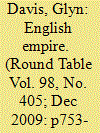

|
|
|
|
|
| Publication |
2009.
|
| Summary/Abstract |
Australia in the 1950s received and subsidised its first international students from neighbouring Asian countries under the Colombo Plan to train 'the expert minds' necessary for development. During the 1980s subsidies were phased out, but the number of international students greatly increased. Migration rules based on points encouraged such students to become skilled migrants. Globalisation brought massive increases in student numbers and competition for revenue from their fees. English-speaking countries have market advantages because of the 'empire' of the United States; but it is dangerous to become over-reliant on overseas fee income. Public funding and curriculum structures need reform.
|
|
|
|
|
|
|
|
|
|
|
|
|
|
|
|
| 7 |
ID:
092169


|
|
|
|
|
| Publication |
2009.
|
| Summary/Abstract |
The private papers of Sir Philip Morris reveal how he prepared himself for the chairmanship of the 1959 Oxford Conference on Commonwealth Education with briefing from the Commonwealth Relations Office, what he brought to the meeting from his own experience, and what he learnt from the chair. British ministers and officials as hosts of the conference were ambivalent about its outcome. They could not disentangle the prospect of educational co-operation across the Commonwealth from all that was being done to set up a system for giving development assistance to the new states created by decolonisation.
|
|
|
|
|
|
|
|
|
|
|
|
|
|
|
|
|
|
|
|
|